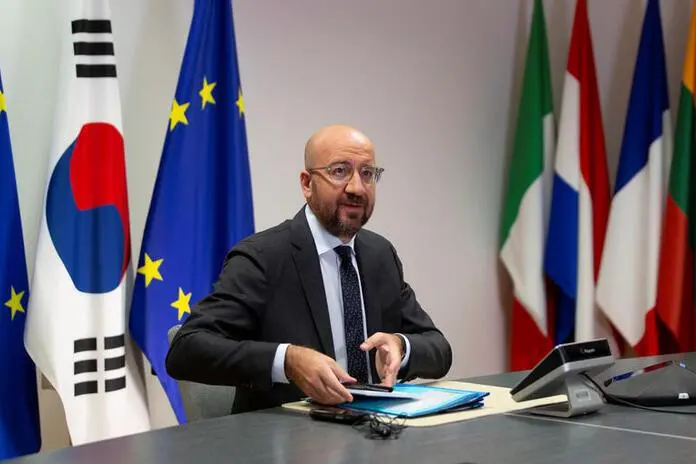PHOTO
The great American writer, the expatriate James Baldwin, summed up Europe, and its intellectual relationship with America, perfectly. The Old Continent “has what we (in the US) do not have yet, a sense of the mysterious and inexorable limits of life, a sense, in a word, of tragedy. And we have what they sorely need: A sense of life’s possibilities.”
There is little doubting that the past generation has been a geostrategic tragedy for Europe. Two decades of economic sclerosis, military irrelevance, and deep political divisions have put paid to any further grandiose thoughts about the EU’s place in the world. Saying this, the EU, at present, must heed Baldwin’s call for the continent to have a sense of possibility.
While it is surely true that the EU has failed to become a superpower, the new world we live in is characterized by loose bipolarity, wherein great powers just behind the US and China in capability — such as the EU, Russia, the Anglosphere countries, India, and Japan — have a great deal of strategic room to maneuver independent of Sino-American wishes and dictates. As such, a battered Europe very much matters again.
The EU, at the grand strategic level, has a real choice to make about the brewing Sino-American Cold War: It can side with rising power China, continue to primarily back its long-time US ally or hew its own neutralist path. The ultimate decision Brussels comes to will have profound effects on the Cold War’s ultimate outcome, as well as for the EU itself.
In terms of tilting to China, there is no doubting the explosion in trade between the two powers is drawing them together. The EU as a whole is Beijing’s primary trading partner, with China accounting for 19 percent of all EU imports in 2019. Fully 18 EU member states have linked up with China’s signature Belt and Road Initiative, its geostrategic effort to bind the Eurasian continent economically together under Beijing’s dominance.
But for all the growing economic synergies between the two, a full-fledged Sino-European alliance — generally directed against the US — is simply not on the cards. As European Council President Charles Michel put it, the EU and China “do not share the same values, political systems, or approach to multilateralism.”
This strategic point is crucial. EU member states’ general (vague if heartfelt) worries about human rights, the rule of law, and multilateralism just do not mesh well with a China imprisoning 1 million Uighurs in western Xinjiang province, extinguishing Hong Kong’s freedoms, or bullying people in the South China Sea, in defiance of UN rulings in the Hague over China’s overweening claims there. Due to all this, a decisive EU tilt toward Beijing as a whole remains a pipe dream.
However, the US has been far too cavalier during the current administration in just assuming that the EU will fall meekly in line behind the US in this new Cold War. A June survey, conducted by the European Council on Foreign Relations, found a 59 percent majority saying that their view of the US has deteriorated during the coronavirus crisis. The administration's signal mismanagement of the pandemic seems to have turned into a broader question of American competence.
Given European hatred of the president specifically, and policy disagreements with his administration more generally (over Iran, trade, energy policy, global warming, the World Trade Organization, etc.), it must now be an open question as to whether the centrality of the transatlantic alliance remains the EU’s goal in the new era. If American incompetence is added to these policy disagreements, coupled with the White House’s shockingly bad efforts at alliance management, things, frankly, do not look good.
But could the EU really follow French President Emmanuel Macron’s fevered Gaullist dream, making the dynamic policy changes necessary to refashion the EU to “be able to stand up against China, against the US, against the disorder we are currently witnessing.” I think not.
Although the joys of neutrality for the EU in the new Cold War are enticing, it simply won’t work as a successful strategic policy option. Again, the EU is only a great power and not a superpower. As the world is not tripolar, a relatively weaker EU will remain divided and unable to globally compete on its own with either China or the US.
EU member states would have to pay to construct the bloc’s own independent military, eschewing US-dominated NATO. There has been no empirical sign in decades that EU states will ever pay an appropriate amount for their own defense, whatever the institutional configurations. This will not change now in a time of economic peril. In the end, much like the aging Rolling Stones, EU-US relations are based less on liking one another and more on the reality that they are practically stuck with one another.
Saying this, history is replete with examples of great powers making the wrong decision. The next US administration must be very careful not to stupidly throw the EU into the arms of neutrality through arrogant and unnecessary antagonisms of allies who once again matter. For the EU, as Baldwin hinted at, may just discover its new possibilities.
- Dr. John C. Hulsman is the president and managing partner of John C. Hulsman Enterprises, a prominent global political risk consulting firm. He is also senior columnist for City AM, the newspaper of the City of London. He can be contacted via www.chartwellspeakers.com.
Copyright: Arab News © 2020 All rights reserved. Provided by SyndiGate Media Inc. (Syndigate.info).





















